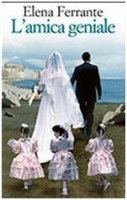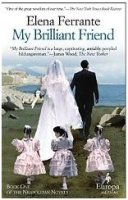Once written, a book no longer needs it author – Elena Ferrante
 In an era of relentless social media, around the clock tweets, Facebook pages, Goodreads fans, and endless promotion required to sell books, most authors might balk at these words.
In an era of relentless social media, around the clock tweets, Facebook pages, Goodreads fans, and endless promotion required to sell books, most authors might balk at these words.
And yet this sentiment of a seemingly bygone era are the words of the contemporary Italian author Elena Ferrante in a 7 November 2014 interview in Io donna, the magazine that accompanies the Italian newspaper Corriere della sera.
The formula seems to have worked well for Ferrante. No one knows her true identity, but her books, particularly her four books set in Naples, have been read and loved by millions of readers in twenty countries around the world.
My blogging friend, Claire, over at the wonderful Word by Word has read the English translations and written about them over on her site.
Ferrante’s stories follow Lena and Lila, two girls growing up in poor families in post-war Naples. The four novels allow us to follow their lives from the 1950s up until 2010. Ferrante writes about complicated themes – the love-hate relationships within families, the violence in the poor Naples neighborhood in which her characters live,and the competitive and envious relationship that exists between close female friends.
 Speculation abounds as to Ferrante’s real identity. It’s been said the writer is actually a male (Just my two cents: I’ve read the first novel in the original Italian, and I find it extremely hard to believe it was written by a man). It’s also been rumored the author uses a nom de plume because the story is biographical.
Speculation abounds as to Ferrante’s real identity. It’s been said the writer is actually a male (Just my two cents: I’ve read the first novel in the original Italian, and I find it extremely hard to believe it was written by a man). It’s also been rumored the author uses a nom de plume because the story is biographical.
Whatever the reason the author chooses to remain anonymous, today it’s a radical choice. Is what Ferrante says true? Is an author’s work done once she completes her novel? Should the work be judged on its own merits, without the need for an author to promote and allow us a window into her life?
In Ferrante’s case, anonymity certainly hasn’t damaged her sales. But it doesn’t seem a formula easy to replicate.
What do you think, readers and writers? And if you’ve read Ferrante’s books, what do you think about them?
I really wish it were true that an author could abandon her work to the reading world. I guess word of mouth must have worked its magic initially for Ferrante, but then I’ve read these are very strong books. I think I will be buying myself copies in Italian this winter!
I agree, Catherine. But still, I was impressed when I read this interview with her. Fantastic that she can de fully concentrated on her writing, and has never been involved in any type of promotion (except for the extremely rare interview). Alas, not a model most writers can follow. I’ve only read the first book, in italiano, and enjoyed it. I’ll also be reading the others. We can compare notes!
I agree that the magical word-of-mouth worked for Ferrante, however, as it was once pointed out to me by someone in the industry, word-of-mouth involves a lot of publicity work, it’s just a different to your usual advertising and hype. She also writes books strong enough to stand on their own and they’ve got us all talking.
As for the pseudenym (and I agree with you completely, I find it very difficult to believe these books could have been written by a man – and the suggestion makes me angry because it’s blatant sexism), if she chose it because the Neopolitan novels were autobiographical, she’d made a decision to write them a long time ago. Do I believe that? It’s possible but I don’t really think so. I think some readers like to think that things writers write that are realistic have to be autobiographical rather than the fact someone’s a good writer who can bring a scene, a character, a town to life.
Thanks, Naomi. Excellent ideas here. What’s very special in the first book (and I still must read the next three) is the love/jealousy/rivalry that exists between the two female protagonists. I think Ferrante does this extremely well, and it also emerged in her Corriere della Sera interview. In the end, the men enter and exit Lena and Lila’s lives, but their friendship (even with all its flaws) endures. And yes, I agree that it is sexist to assume a man must have written such successful books. When those of us dedicated to promoting women authors know such convincing and insightful books on life, family, and female friendships could only have been written by a woman… : )
there was a very attractive 40something lady on the plane back to uk and she was driving the terribly-busy ryan air stewards a bit mad so i thought, “There’s someone I’d like to be friends with.” She had this book in hand, in italian. Hmm. And now i’m reading about it here. Perhaps that’s a sign to read it!
Think you’d like it, Terianne. The Italian’s not too difficult either.
I haven’t read any book by Ferrante but I find her or him intriguing. It’s hard to remain anonymous and yet being read by so many people. There are a few YA books published in the USA under the name Anonymous. All approach hard topics of life and I have no idea who wrote them, although I’m pretty sure it’s a woman. Should I try Ferrante?
Thanks for your comment, Evelyne! Yes. I think you’d like Ferrante. Interesting about anonymous YA authors. I didn’t know there were some.
[…] already written about what Ferrante spoke about in an interview with Corriere della sera, see my earlier post here. In this interview, Ferrante claims that once a book is written, an author’s job is done. […]